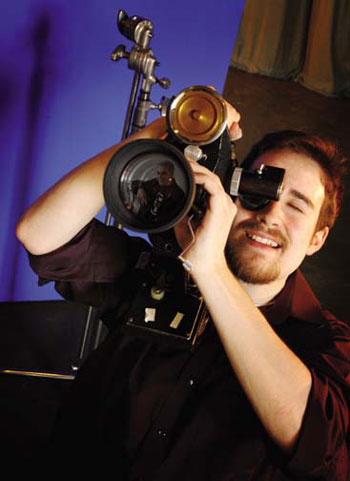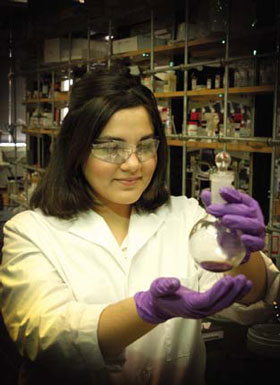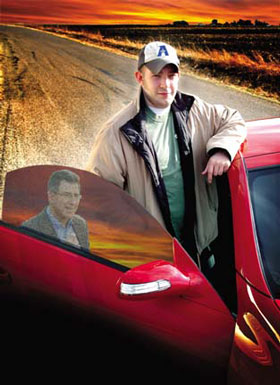| Defining the brand | Advertising the brand | Living the brand |
| Home Forethought President's Message Campus Buzz Feature Stories Re:Search The Score Alum News Yesteryear | ||
 For filmmaker Frank Mosley, everything hinges on the story.
For filmmaker Frank Mosley, everything hinges on the story.
“Literature is the basis of good film, even good music,” he says. “You go to a movie to be scared, to fall in love. You go there not just to see and hear, but to feel something.”
Mosley, an English major with a minor in art and art history, film and video emphasis, says his love for literature began before he could read. His parents read to him regularly and fostered his creativity.
He began making movies when he was 8 and has bonded with a small camp of students in the Department of Art and Art History’s film program who also began making movies when they were children. While in high school, he says, he often made a film every day. It takes longer these days, since his films have more complex themes—psychology, theology, Greek mythology.
Balls in the Ice Box, a three-minute film he made in Bart Weiss’ Intermediate Film class, is a comic examination of masculinity that reveals an unexpected fragility. The film won the Audience Favorite Award in the UT Arlington Film Festival at the Angelika Film Center in Dallas in 2003 and was later showcased at the Dallas Museum of Art.
“Frank has always had a knack for good storytelling,” Weiss said. “His films have good performance and good timing. Aside from being a good filmmaker, his attitude has been a good influence on the film-video area.”
Holy the Sabbath, Mosley’s most recent film, takes 11 minutes to tackle the struggle between faith and consumerism. Mosley also starred in the award-winning independent film Separated by Light, produced by friends from the film program. In another work coming out soon, he plays an Irish bartender in a speakeasy.
English Professor Laurin Porter met Mosley when he was a freshman in one of her courses, a class on the theme of “the double” in 19th-century American literature. He credits her with helping him choose the best path in life.
“It has been rewarding to watch Frank grow over the years,” Dr. Porter said. She has taught him in four classes and attended film festivals, sharing in his accomplishments in that discipline as well.
After finishing his degree in December, Mosley plans to teach English while continuing to make films. He has formed a company, Film Alliance, with classmates Fredrick Trevino and Thomas Lumpkin, and they’re working on a 10-minute film Mosley wrote called LITTLE BOY on the creation of the atomic bomb in the 1940s.
He predicts that Film Alliance will stick together and produce movies for years to come, with the goal of a feature-length film in the not-so-distant future.
 Medicine woman
Medicine woman
Rosie Whitten’s future took an unexpected turn two years into earning a business degree when she enrolled in a biology course for a science requirement.
“Someone in class did a presentation on biochemistry,” she said. “That’s when I knew this is what I wanted to do.”
As an undergraduate, the biochemistry major fought one of the most deadly infectious diseases—tuberculosis. And she made progress.
Under the direction of chemistry Associate Professor Carl Lovely and graduate research assistant Lesley Schmid, Whitten recently discovered an easier method for creating a synthetic molecule that one day may lead to more effective drug treatments for the disease, which has seen a resurgence due to neglect of TB control programs, HIV/AIDS, inadequate treatment regimens and the growing number of drug-resistant strains.
“I was elated,” she said. “I was so lost in just trying to find something that worked, and all of a sudden it was like someone turned on the lights.”
Whitten’s groundbreaking method is now regularly used in the lab Dr. Lovely oversees.
“That’s the thing about coming up with a research idea,” Schmid said. “It’s definitely collaboration. It’s part of the learning experience to take that knowledge and move on to the next step.”
Her colleagues strongly encouraged Whitten to take the lead in the project.
“It was put upon me to find answers to my questions, without going to Lesley or Dr. Lovely,” said Whitten, adding that this enabled her to expand her research skills and abilities.
“Ultimately, they’re learning to become independent scientists,” Lovely said. “And while I expect scientific independence from graduate students, I rarely see it in undergraduate students. In 10 years at UT Arlington, I have seen it in three students, and Rosie is one of those.”
Whitten’s participation in the tuberculosis research project is part of the University’s McNair Scholars Program, which required her to complete at least one summer of research under the guidance of a faculty mentor.
The program is one of approximately 160 McNair programs funded by the U.S. Department of Education each year to increase the number of disadvantaged or underrepresented students who obtain a doctoral degree and pursue a career in higher education.
Students receive a $2,800 stipend during their summer research and present their findings at the annual McNair Research Presentations in August. Those findings are then published in the McNair Research Journal. Whitten’s summary can be found in the summer 2005 edition.
In conjunction with her undergraduate degree, she also completed a senior thesis on her research findings, which she presented in the spring at the Annual Celebration of Excellence by Students.
Overall, the experience has offered Whitten opportunities she never considered. After graduating in May, she plans to study medicinal chemistry at the University of Notre Dame, where she has been offered a full scholarship and a stipend.
Asked if there’s a particular research project she’d like to tackle, she said, “My fiancÚ would tell you ‘everything.’ Because that’s just how I am. I want to do everything.”
 Magnetic research
Magnetic research
Senior physics major James Creel discovered research at a science camp for high school students.
The College of Science hosted the ExxonMobil Texas Science & Engineering Fair at the Arlington Convention Center in spring 2002, and Creel, who grew up near Houston, attended. He didn’t win, but his interactions with UT Arlington faculty persuaded him to pursue his undergraduate degree in physics in Arlington. Since his freshman year, the budding scientist has been a huge asset to physics and the entire college, said Lori Norris, coordinator of special programs in the Dean of Science Office.
“He has held leadership positions in several student organizations and is always willing to volunteer for special activities we sponsor. He attends local recruiting and outreach events and does demonstrations of physics principles that involve lots of noise, mess and excitement,” Norris said. “The demos are always the center of attention, which is a great way to engage our future students.”
Coming here was the right decision, Creel says.
“Dr. Koymen (Professor Ali Koymen) lets me do what I want to do. But he’s there if you need him; he keeps you focused.”
What Creel wanted to do is test various orientations for magnets, used in Europe for years to increase fuel efficiency in motor vehicles. Evidence was mounting both for and against their effectiveness.
Magnets are commonly arranged in configurations called Halbach arrays, after Klaus Halbach, a retired Lawrence Berkeley National Laboratory physicist. Conceived for particle accelerators, Halbach arrays concentrate the magnetic field on one side while canceling it on the opposite side.
Creel designed a different orientation and began testing it: first in a truck, then a sports utility vehicle and, finally, a car. The experiments proved inconclusive because so many other variables, like driving conditions, affect fuel consumption.
So he bought a generator and is now performing experiments that are more controlled. This summer he will be at Baylor University, where he has received funding from the National Science Foundation.
“I’m going to be paid to do research,” he said with a broad smile.
— Susan Slupecki and Sue Stevens
| Archives
| Alumni Association |
Giving to UT Arlington | UT
Arlington Home Copyright © 2006 UT Arlington Magazine. All rights reserved. |
